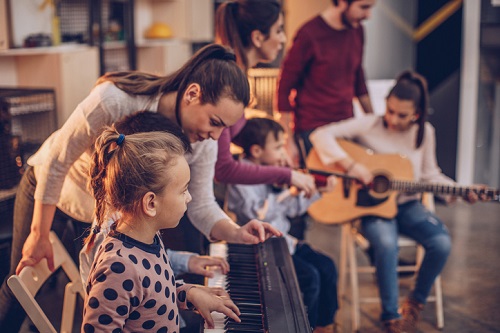Key Takeaways
- Music education is crucial in child development, enhancing cognitive and emotional skills.
- Engaging in music improves academic performance and social skills.
- Despite its benefits, music education programs often need more funding.
- Your contributions can significantly impact these programs and the lives they touch.
Table of Contents
- The Power of Music in Child Development
- How Music Education Enhances Academic Performance
- Cultural Awareness and Social Skills
- Music as a Tool for Mental Health
- Challenges Facing Music Education Programs
- How Your Contributions Make a Difference
- Real-Life Impact: Stories from the Field
- Join the Movement: Supporting Music Education
The Power of Music in Child Development
Music shapes young minds in many ways, enhancing cognitive skills, boosting emotional intelligence, and fostering creativity. Children develop critical cognitive functions such as memory, attention, and problem-solving skills through actively engaging in music. Music also boosts emotional intelligence, as it helps children understand and express their feelings more effectively. Furthermore, being involved in music encourages discipline, patience, and teamwork, which are essential values for personal and professional growth. The long-term impacts of music education are profound, and by supporting music donation programs, you are playing a crucial role in facilitating these positive outcomes for children.
How Music Education Enhances Academic Performance
Music education has been consistently linked to improved performance in core academic subjects like mathematics and reading. According to a study by the American Educational Research Association, students involved in music are more likely to excel in standardized tests and show sustained academic improvements over time. This is mainly because learning music involves harnessing critical thinking, pattern recognition, and focused attention. These cognitive abilities are highly transferable to other academic disciplines, creating a ripple effect that boosts overall academic performance. Moreover, the structured environment of music education nurtures a sense of discipline and time management, which are indispensable life skills.
Cultural Awareness and Social Skills
The capacity of music education to expose kids to various cultures and customs while promoting an inclusive and understanding atmosphere is one of its many unique benefits. In today’s globalized world, cultural awareness is more critical than ever, and music is a universal language bridging cultural divides. Participation in group performances, such as orchestras or choirs, further enhances social skills by teaching students to collaborate effectively, respect their peers, and work towards common goals. These encounters improve their comprehension of many cultures, and they acquire vital social skills that will serve them well throughout life.
Music as a Tool for Mental Health
Engaging with music has a pronounced positive impact on mental health. It offers an emotional outlet, providing a healthy way to release stress and reduce anxiety. Music’s rhythmic and structured nature can be particularly beneficial for children with special needs, supplying a sense of stability and a medium for self-expression they might otherwise struggle to find. Schools that integrate music into their curriculum often report a noticeable improvement in student well-being, social adjustment, and overall school climate. Music therapy is increasingly recognized as a practical approach to addressing mental health issues, underscoring the vital role that music education can play in promoting emotional well-being.
Challenges Facing Music Education Programs
Despite its myriad benefits, music education frequently faces challenges such as budget cuts and a need for more resources. Schools, particularly those in underprivileged areas, struggle to maintain and sustain their music programs. These challenges often stem from a need for more awareness about the vital importance of music education in overall child development. Consequently, funding for these programs needs to be improved. This makes external support and funding critical to the survival and success of music education programs. You can help close this disparity and guarantee that all kids can benefit from music education by donating, supporting events, or pushing for legislative reforms.
How Your Contributions Make a Difference
Contributions in donations play a pivotal role in sustaining music education programs. Funds are used to provide instruments, sheet music, and opportunities for students to attend music camps, workshops, and competitions. You directly influence children’s lives by supporting organizations promoting music education and providing them with the necessary resources to thrive personally and intellectually. It’s essential to recognize that every donation, whether large or small, contributes to the sustainability and growth of these crucial programs. By donating, you help foster a new generation of students who will benefit from the myriad advantages of music education.
Real-Life Impact: Stories from the Field
Countless inspiring stories illustrate the transformative power of music education. Take, for instance, a student from a low-income background who learned to play the violin through a school music program. This student excelled academically and earned a college scholarship, attributing their success to the skills and discipline they developed through music. These real-life examples highlight the long-term benefits of supporting music education and demonstrate how it can open doors to future opportunities. These success stories are a testament to music education’s profound impact on individual lives, serving as powerful motivators for continued support and investment in these programs.
Join the Movement: Supporting Music Education
There are numerous ways to get involved and support music education programs. Donating time as a volunteer, providing financial contributions, or offering resources such as musical instruments can all make a significant difference. For more detailed ways to help, consider checking reliable organizations advocating for music education. According to NPR, students overwhelmingly report positive impacts from music education, underscoring the importance of these programs. Regardless of its size, your contribution can significantly impact the future of music education and the countless lives it touches. By joining the movement, you play a vital role in ensuring that music continues to enrich the lives of students and the broader community.
Stay in touch to get more news & updates on Ventstribune.Com!

